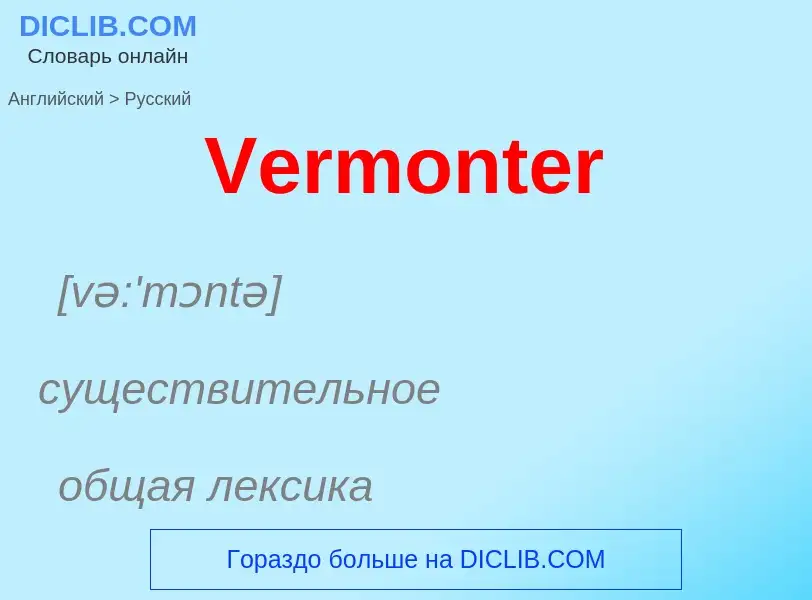Μετάφραση και ανάλυση λέξεων από την τεχνητή νοημοσύνη ChatGPT
Σε αυτήν τη σελίδα μπορείτε να λάβετε μια λεπτομερή ανάλυση μιας λέξης ή μιας φράσης, η οποία δημιουργήθηκε χρησιμοποιώντας το ChatGPT, την καλύτερη τεχνολογία τεχνητής νοημοσύνης μέχρι σήμερα:
- πώς χρησιμοποιείται η λέξη
- συχνότητα χρήσης
- χρησιμοποιείται πιο συχνά στον προφορικό ή γραπτό λόγο
- επιλογές μετάφρασης λέξεων
- παραδείγματα χρήσης (πολλές φράσεις με μετάφραση)
- ετυμολογία
Vermonter - translation to ρωσικά
[və:'mɔntə]
существительное
общая лексика
вермонтец
уроженец штата Вермонт
[və:'mɔnt]
существительное
общая лексика
Вермонт
география
Вермонт (штат США)
Ορισμός
Βικιπαίδεια
Vermont ( (listen)) is a state in the New England region of the Northeastern United States. Vermont is bordered by the states of Massachusetts to the south, New Hampshire to the east, New York to the west, and the Canadian province of Quebec to the north. Admitted to the Union in 1791 as the 14th state, it is the only state in New England not bordered by the Atlantic Ocean. According to the 2020 U.S. census, the state has a population of 643,503, ranking it the second least-populated in the U.S. after Wyoming. It is also the nation's sixth-smallest state in area. The state's capital Montpelier is the least-populous state capital in the U.S., while its most-populous city, Burlington, is the least-populous to be a state's largest.
For some 12,000 years, indigenous peoples have inhabited this area. The competitive tribes of the Algonquian-speaking Abenaki and Iroquoian-speaking Mohawk were active in the area at the time of European encounter. During the 17th century, French colonists claimed the territory as part of the Kingdom of France's colony of New France. After the Kingdom of Great Britain began to settle colonies to the south along the Atlantic coast, the two nations competed in North America in addition to Europe. After being defeated in 1763 in the Seven Years' War, France ceded its territory east of the Mississippi River to Great Britain.
Thereafter, the nearby British Thirteen Colonies, especially the provinces of New Hampshire and New York, disputed the extent of the area called the New Hampshire Grants to the west of the Connecticut River, encompassing present-day Vermont. The provincial government of New York sold land grants to settlers in the region, which conflicted with earlier grants from the government of New Hampshire. The Green Mountain Boys militia protected the interests of the established New Hampshire land grant settlers against the newly arrived settlers with land titles granted by New York. Ultimately, a group of settlers with New Hampshire land grant titles established the Vermont Republic in 1777 as an independent state during the American Revolutionary War. The Vermont Republic abolished slavery before any of the other states.
During the mid-19th century, Vermont was a strong source of abolitionist sentiment, although it was also tied to King Cotton through the development of textile mills in the region, which relied on Southern cotton. It sent a significant contingent of soldiers to participate in the American Civil War.
The geography of the state is marked by the Green Mountains, which run north–south up the middle of the state, separating Lake Champlain and other valley terrain on the west from the Connecticut River Valley that defines much of its eastern border. A majority of its terrain is forested with hardwoods and conifers, and a majority of its open land is devoted to agriculture. The state's climate is characterized by warm, humid summers and cold, snowy winters.
Vermont's economic activity of $34 billion in 2018 ranked last on the list of U.S. states and territories by GDP but 34th in GDP per capita. In 2000, the state legislature was the first to recognize civil unions for same-sex couples. As of 2021, the state ranked 12th among U.S. states and territories on the United Nations Human Development Index.



![[[Mount Mansfield]] [[Mount Mansfield]]](https://commons.wikimedia.org/wiki/Special:FilePath/2017-09-11 10 27 43 View east along the Maple Ridge Trail at the junction with the Frost Trail on the western slopes of Mount Mansfield within Mount Mansfield State Forest in Underhill, Chittenden County, Vermont.jpg?width=200)
![Watercolor]] of an [[Abenaki]] couple, 1700s Watercolor]] of an [[Abenaki]] couple, 1700s](https://commons.wikimedia.org/wiki/Special:FilePath/Abenakis.jpg?width=200)
![The ''[[Ethan Allen Express]]'' alongside the [[Island Line Trail]] in Burlington The ''[[Ethan Allen Express]]'' alongside the [[Island Line Trail]] in Burlington](https://commons.wikimedia.org/wiki/Special:FilePath/Amtrak and bike trail (cropped).jpg?width=200)

![Berlin]] Berlin]]](https://commons.wikimedia.org/wiki/Special:FilePath/E. F. Knapp State Airport.jpg?width=200)
![A circa 1775 flag used by the [[Green Mountain Boys]] A circa 1775 flag used by the [[Green Mountain Boys]]](https://commons.wikimedia.org/wiki/Special:FilePath/GreenMtBoys.jpg?width=200)
![The [[hermit thrush]], the state bird of Vermont The [[hermit thrush]], the state bird of Vermont](https://commons.wikimedia.org/wiki/Special:FilePath/Hermit Thrush (13635301894).jpg?width=200)
![climate normals]]. climate normals]].](https://commons.wikimedia.org/wiki/Special:FilePath/Köppen Climate Types Vermont.png?width=200)
![Grand Isle]] in winter Grand Isle]] in winter](https://commons.wikimedia.org/wiki/Special:FilePath/LCTC ferry Cumberland in winter 1 (cropped).jpg?width=200)
![[[Lake Champlain]] [[Lake Champlain]]](https://commons.wikimedia.org/wiki/Special:FilePath/LakeChamplain.jpg?width=200)
![[[Fall foliage]] at [[Lake Willoughby]] [[Fall foliage]] at [[Lake Willoughby]]](https://commons.wikimedia.org/wiki/Special:FilePath/LakeWilloughbyPisgah.jpg?width=200)
![The [[Lyndon Institute]], a high school in [[Lyndon, Vermont]] The [[Lyndon Institute]], a high school in [[Lyndon, Vermont]]](https://commons.wikimedia.org/wiki/Special:FilePath/Lyndon Institute.jpg?width=200)


![Marlboro]] voters meet in this building. Marlboro]] voters meet in this building.](https://commons.wikimedia.org/wiki/Special:FilePath/Meeting house marlboro vermont 20040911.jpg?width=200)

![Snake Mountain]] at right Snake Mountain]] at right](https://commons.wikimedia.org/wiki/Special:FilePath/SnakeMT 20151011 (23945838081).jpg?width=200)
![Stowe]] Resort Village Stowe]] Resort Village](https://commons.wikimedia.org/wiki/Special:FilePath/Stowe village Stevage.jpg?width=200)
![Rutland]] Rutland]]](https://commons.wikimedia.org/wiki/Special:FilePath/The Bus Rutland (cropped).jpg?width=200)
![The [[University of Vermont]]<br /> Old Mill, the oldest building of the university The [[University of Vermont]]<br /> Old Mill, the oldest building of the university](https://commons.wikimedia.org/wiki/Special:FilePath/UVM Old Mill building 20040101.jpg?width=200)
![Montpelier]] Montpelier]]](https://commons.wikimedia.org/wiki/Special:FilePath/Vermont State House Montpelier October 2021 HDR.jpg?width=200)
![Vernon]] Vernon]]](https://commons.wikimedia.org/wiki/Special:FilePath/Vermont Yankee Nuclear Power Plant.jpg?width=200)
![[[Vermontasaurus]] sculpture in Post Mills, in 2010 [[Vermontasaurus]] sculpture in Post Mills, in 2010](https://commons.wikimedia.org/wiki/Special:FilePath/Vermontasaurus-2010-07-07.jpg?width=200)
![[[Silurian]] and [[Devonian]] stratigraphy of Vermont [[Silurian]] and [[Devonian]] stratigraphy of Vermont](https://commons.wikimedia.org/wiki/Special:FilePath/WaitsRiverXSection.png?width=200)
